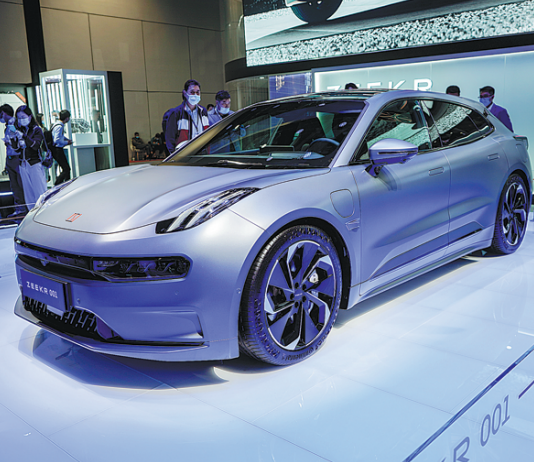Carmakers using other companies' showrooms

Carmakers are partnering with home appliance makers and consumer electronics companies to sell cars through their vast brick-and-mortar dealership networks.
Chinese carmaker Geely is in talks with Haier Group, and vehicles under Geely's electric brand Zeekr will be available at the home appliance giant's retail stores, according to local Chinese media.
The companies will also be collaborating in other vehicle-related areas, according to Cailian Press. The outlet reported the news last week, citing sources from both Geely and Haier.
The partnership between Geely and Haier would be similar to the one between Chinese smartphone maker Huawei and EV maker Seres, which allows its SF5 model to be sold at the technology company's online and brick-and-mortar stores in China.
In April, Chinese new energy vehicle startup Skywell bought home appliance maker Skyworth's trademark for vehicles. Skywell is also using Skyworth's dealerships to showcase and deliver its vehicles.
Roy Lu, a senior industry analyst, said using the existing retail stores of such companies is an easier and cheaper way for carmakers to reach potential customers in smaller cities than extending their own dealership networks.
Many carmakers in China are also moving into smaller cities, which are succeeding big cities as the new growth engines of the Chinese automotive market.
Lu said home appliance buyers are car companies' potential customers, and carmakers are trying to market vehicles as ordinary consumer goods that should be updated in a shorter period of time.
This is also seen in the rise of carmakers, especially electric car startups, showcasing their vehicles at downtown shopping malls while cutting the number of suburban dealerships.
Such startups usually adopt a direct sales model with a fixed price that allows customers to place their orders online.
Florian-Frederik Deutgen, director of automotive, strategy and consulting for Accenture Greater China, said: "Even in a direct sales model, we will definitely have steps along the process of purchasing a car that happen offline. Buying a car is a large transaction and customers need the trust and empathy only a physical interaction can provide.
"Apart from that, most customers still want to experience the product offline and would not be satisfied with purely virtual test drives," Deutgen added. "That's why dealers will still have a very important part in automotive retail."
The cooperation between carmakers and home appliance makers is also believed to pave the way for their deepened partnership in the future.
Competition in the home appliance market is red-hot and companies in the industry are exploring opportunities in the booming electric car sector.
Geely and Haier are expected to collaborate on connected vehicles, smart homes, sales channels and models, as well as finance and e-payment systems.
"The cooperation between the two parties is currently in progress and we will disclose the latest developments in due course," Haier said.
The partnership with Geely would mark Haier's second push into the automotive market this year, following its partnership with SAIC Motor signed in March to develop smart transportation systems and smart homes.
Haier and SAIC will also join hands in areas such as autonomous driving, as well as lightweight-material development and application, according to Shanghai-based news portal The Paper.
Last month, another home appliance maker Midea Group revealed plans to produce a range of components and control systems for cars at a plant in Hefei, Anhui province.

